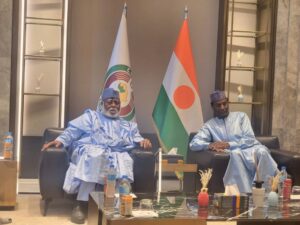 The leader of the ECOWAS delegation to Niger Republic, retired General Abdulsalami Abubakar, said on Tuesday that their meeting with the coup plotters in Niger has opened an avenue for discussion.
The leader of the ECOWAS delegation to Niger Republic, retired General Abdulsalami Abubakar, said on Tuesday that their meeting with the coup plotters in Niger has opened an avenue for discussion.
Abdulsalami, who is also a former Nigerian head of state, said he believes diplomacy will prevail despite the ECOWAS’ threat to militarily intervene in the country’s crisis.
“Our visit to Niger has been very fruitful and that it has opened an avenue to start talking and hopefully, we’ll get somewhere,” Abdulsalami said.
He said he has delivered the terms of the junta to the ECOWAS and that communication has commenced between the two parties.
“We’ve started talking, they have made their own points and then I made my report to the Chairman of the ECOWAS Heads of State and President. He will now consult with his colleagues and then we’ll get somewhere hopefully,” he said.
The former head of state expressed hope that military action would be avoided by both parties, saying nobody wants to go to war.
“Hopefully diplomacy will see the better of this. Nobody wants to go to war, it doesn’t pay anybody, but then again, our leaders have said if all fails and I don’t think all will fail, we’ll get somewhere we’ll get out of this mess,” he said.
Meanwhile, last Saturday, the leader of the Niger junta in a televised broadcast proposed a three-year power transition plan, but the ECOWAS has rejected the plan, insisting that democracy must be restored in Niger.
The ECOWAS has imposed sanctions on the junta and threatened to use military force if the coup leaders do not step down.
The situation in Niger is a major test for the ECOWAS, which has been struggling to deal with a number of coups and political crises in West Africa in recent years.
The bloc has been criticized for its heavy-handed approach to restoring democracy in some countries, but it is also seen as the only regional body with the power to prevent the spread of instability in the region.
The outcome of the negotiations between the ECOWAS and the Niger junta will be closely watched by other countries in West Africa, as well as by the international community.

White House Says Military Option Open On Greenland Acquisition
Trump Calls Case Against Maduro “Infallible” Ahead Of U.S. Court Appearance
South Africa Raids U.S. Refugee Processing Centre, Arrests Seven Kenyans
Time Magazine Names AI Visionaries ‘Person of the Year’